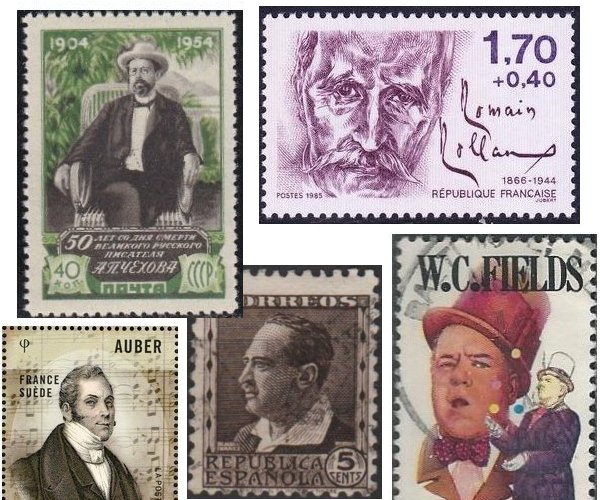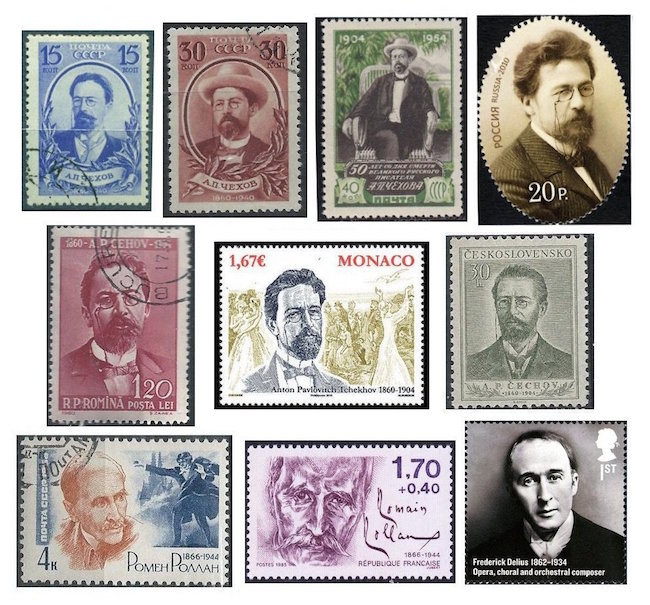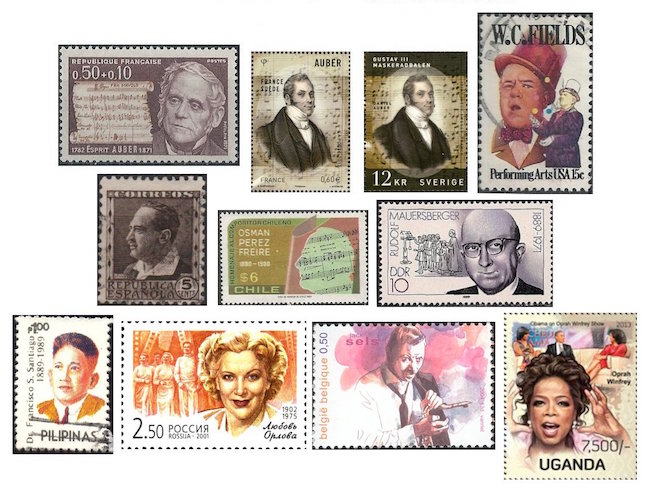The Arts on the Stamps of the World — January 29
An Arts Fuse regular feature: the arts on stamps of the world.

By Doug Briscoe
Today we note the birthdays of Anton Chekhov, Romain Rolland, Frederick Delius, W.C. Fields, and quite a few others, including Oprah Winfrey.
The great Anton Chekhov (29 January 1860 [O. S. 17 January] – 15 July [O. S. 2 July] 1904) tops our list today for his magnificent plays and short stories. Naturally, Russia has produced the greatest number of Chekhov stamps, but I offer also examples from Romania, Monaco, and Czechoslovakia.
Romain Rolland (1866 – 30 December 1944) was awarded the Nobel Prize for Literature in 1915, having written novels, plays, biography, art history, and much more. A thinker of wide-ranging interests, he admired Indian philosophy, promulgated pacifism, corresponded with Freud, and wrote biographies of Beethoven, Handel, Michelangelo, Tolstoy, and Gandhi, among others. Regrettably, he also admired Stalin, though not without serious reservations, which he addressed to the dictator personally on their meeting in 1935. His close friend Stefan Zweig, who described Rolland as “the moral consciousness of Europe,” wrote a biography of him in 1921, and in the following year Hermann Hesse dedicated his novel Siddhartha to Rolland. The apogee of Rolland’s extensive writing career is his ten-volume novel series Jean-Christophe (1904–1912).
Frederick Delius (1862 – 10 June 1934) was baptised “Fritz”, a name he used until he was about 40. His parents, of Dutch origin, had been born in Westphalia. Delius’s father repeatedly tried to involve his son in the family business, sending him to oversee affairs in Germany, France, and Sweden, but Delius tended to shirk his duties in favor of seeking out concerts and taking music lessons. Finally, Delius’s dad sent him to Florida to manage an orange plantation. The only metaphorical seed that sprouted from that experience, however, was Delius’s first large-scale orchestral work, the Florida Suite, which he wrote after his return to Europe. Following further study with Carl Reinecke, Delius committed himself to a life as a composer, living with his wife Jelka in France for the rest of their lives. It must have been around that time, though, that Delius contracted the syphilis that led years later to paralysis and blindness. His assistant Eric Fenby helped the ailing Delius complete some late compositions.
I didn’t realize that Daniel François Esprit Auber (1782 – 12/13 May 1871) had written fifty operas! He studied at the Paris Conservatoire with Cherubini, whom Auber would one day succeed as the institution’s director (1842). After a couple of operatic failures, Auber finally had a hit with his fifth opera La Bergère châtelaine, which began a string of successes culminating in his Fra Diavolo of 1830. Besides opera, Auber wrote sacred music and cantatas for state occasions (e.g., for the marriage of Napoleon III and for the capture of the Sevastopol in the Crimean War). There is also instrumental and piano music, much of it dating from his youth—five (!) cello concertos, two string quartets, etc.

William Claude Dukenfield (1880 – December 25, 1946) was, of course, W. C. Fields. A casual fan might not tend to think of him as a great practitioner of physical comedy, but Stephen Fry, in his collection Paperweight, aptly writes: “W. C. Fields, the master, could do things with a boater, a cane and a cigar that put one in mind of what Mozart could do with accidentals, crotchets and a borrowed treble clef.”
Spanish novelist Vicente Blasco Ibáñez (1867 – 28 January 1928) was the author of The Four Horsemen of the Apocalypse (1916), made into a silent vehicle for Rudolph Valentino in 1921 and remade in 1962. Another novel, Blood and Sand (1908), has been translated to the screen no fewer than four times, the first (directed by Ibáñez himself!) in 1917, then in 1922, again with Valentino; then comes the well-known Tyrone Power and Rita Hayworth version of 1941, and the latest rehash, with Sharon Stone, dates from 1989. Greta Garbo’s first two American movies, Torrent and The Temptress, both filmed in 1926, were both drawn from Ibáñez novels. In his earlier writing career, Ibáñez had been more socially aware and less populist, but his best-sellers were no doubt the reason he was honored on a Spanish stamp as early as 1931.
The grandfather of Chilean pianist and composer Osmán Pérez Freire (1877 – 2 April 1930) served under José de San Martín and twice acted as the country’s ruler in the 1820s. That distinguished gentleman’s daughter passed on to her son her love of music. He composed over three hundred pieces, including many tangos and the popular hit “¡Ay, ay, ay!”, which he offered to Carlos Gardel and José Razzano. Toward the end of his life Pérez Freire relocated to Spain. Apparently he wrote a shimmy for one of Fritz Lang’s Doctor Mabuse films in 1922.
Director of the Dresdner Kreuzchor for 41 years, Rudolf Mauersberger (1889 – 22 February 1971) was also a composer. I seem to spend a lot of time in these pages writing about Nazis, which wasn’t the plan when I set out, but anyhow, Mauersberger joined the Nazi Party in 1933, but apparently used his affiliation to moderate the ideology. For example, he refused to let the choirboys perform Hitler Youth songs and bravely persisted, at least until 1938, in presenting music by banned composers like Mendelssohn. Mauersberger’s compositions are largely choral and often mournful: two pieces, the Dresdner Requiem and the hymn “Wie liegt die Stadt so wüst” (How desolate lies the city), were written after the destruction of Dresden; and his e-minor symphony from 1914-16 bears the subtitle “Tragic.” There are also some organ pieces and other works.
Filipino composer Francisco Santiago was also born in 1889. He was best known for his art songs of the kundiman genre, love songs with lyrics in Tagalog, and indeed he has been called “The Father of Kundiman Art Song”, but he also composed a Piano Concerto in b-flat minor that is held to be his finest work. He died on September 28, 1947.

No less a figure than Fyodor Chaliapin recognized in the young Lyubov Orlova (29 January [O.S. 16 January] 1902 – 26 January 1975) a future star. Despite being born to a family of Russian nobles and marrying an economist who was later arrested, Orlova was not hampered in her career. Stalin was so impressed with her work in Jolly Fellows (1934) that he named her an “Honorable actor of the RSFSR”. She went on to star in Stalin’s favorite movie, Volga-Volga (1938). Later she would be the first woman recognized exclusively for her work in cinema as a People’s Artist of the USSR. Orlova even had a cruise ship named for her. Her second husband was the director Grigori Aleksandrov.
The Belgian jazz saxophonist Jack Sels (1922 – 21 March 1970) was able to build a collection of some 10,000 jazz albums, only to lose them in a bombing during the Second World War. (As a collector myself, with a library of similar scope, I shudder to think of it.) But he began to rebuild it while learning of the newest music introduced to him by the many American and Canadian soldiers who arrived in his home town of Antwerp. When Dizzy Gillespie, one of of Sels’s idols, came to perform there in 1948, Sels was inspired to form his own band, for which he arranged and composed the music. Unfortunately, he left few recordings and died of a heart attack at age 38.
Yes, there’s a stamp for Oprah Winfrey (born Orpah Gail Winfrey in 1954)—it was issued by Uganda in 2013 on a sheet of four stamps honoring American entertainers of African origin.
I can’t resist pointing out that Speaker of the House Paul Ryan was born on exactly the same day (in 1970) as Boko Haram founder Mohammed Yusuf.
A graduate of the University of Massachusetts with a B.A. in English, Doug Briscoe worked in Boston classical music radio, at WCRB, WGBH, and WBUR, for about 25 years, beginning in 1977. He has the curious distinction of having succeeded Robert J. Lurtsema twice, first as host of WGBH’s weekday morning classical music program in 1993, then as host of the weekend program when Robert J.’s health failed in 2000. Doug also wrote liner notes for several of the late Gunther Schuller’s GM Recordings releases as well as program notes for the Boston Classical Orchestra. For the past few years he’s been posting a Facebook “blog” of classical music on stamps of the world, which has now been expanded to encompass all the arts for The Arts Fuse.
